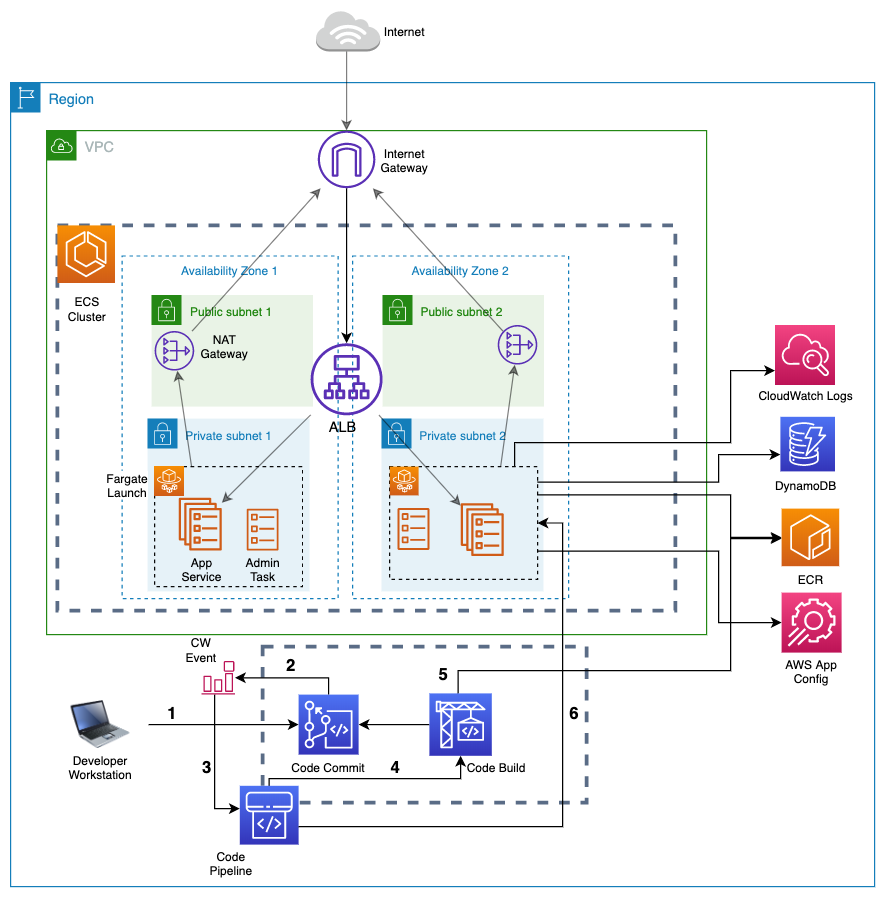Containers
Tag: docker
Improving daemon services in Amazon ECS
When using Amazon EC2 for compute capacity in Amazon Elastic Container Service (Amazon ECS) clusters, a common pattern customers follow is to schedule a single instance of a task across all or select nodes in the cluster. This includes running tasks that handle log and/or metrics collection such as Fluentd or the DataDog agent, node […]
Developing Twelve-Factor Apps using Amazon ECS and AWS Fargate
Sushanth Mangalore and Chance Lee, AWS Solutions Architects, SMB Introduction The twelve-factor methodology helps you build modern, scalable, and maintainable software-as-a-service apps. The methodology is technology agnostic and has become a widely-adopted approach to developing cloud-native applications. There are a few different ways to develop twelve-factor applications on AWS. Solutions based on containers technology are a […]
Automated software delivery using Docker Compose and Amazon ECS
Note: Docker Compose’s integration with Amazon ECS has been deprecated and is retiring in November 2023 In November 2020, Docker Compose for Amazon ECS became generally available. It is now even easier for a developer to take a containerized microservices-based application from their workstation and deploy it straight to the AWS Cloud. Developers can now run […]
Managing compute for Amazon ECS clusters with capacity providers.
Customers running containers are often challenged with having to manage and understand how to run and scale the compute for their clusters. For customers taking advantage of Amazon Elastic Container Service (Amazon ECS) on AWS Fargate, the burden is lifted as the underlying compute layer is fully managed by AWS, enabling the customer to focus […]
Advertising click-prediction modeling on Amazon EKS
In digital advertising, the ad click-through rate (CTR) model predicts the probability of a click given the ads and context x (for example, shopping query, time of the day, device). The output of a CTR model can be seen as a conditional probability p(y = click|x). A precise estimation of this probability influences our ability […]
New look for Amazon ECS in the AWS Management Console
Recently we launched a new look and experience for Amazon ECS in the AWS Management Console. Since its launch in 2014, Amazon Elastic Container Service (Amazon ECS) has served as a simple way for customers to run production grade container workloads on AWS. Customers such as Disney+, Vanguard, Okta, Fidelity, and UbiSoft trust Amazon ECS […]
Using Windows Authentication with Linux Containers on Amazon ECS
This post shows how to configure a Linux container running on Amazon Elastic Container Service (Amazon ECS) to connect to a SQL Server database using Windows (or Integrated) Authentication. Windows Authentication is the recommended mechanism to connect to SQL Server databases, but using it can be challenging when running containerized workloads.
Latest updates to AWS Fargate for Amazon ECS
Recently, we announced features to improve the configuration and metric gathering experience of your tasks deployed via AWS Fargate for Amazon ECS. Based off of customer feedback, we added the following features: Environment file support Deeper integration with AWS Secrets Manager using secret versions and JSON keys More granular network metrics, as well as additional […]
Announcing Amazon ECS deployment circuit breaker
Today, we announced the Amazon ECS deployment circuit breaker for EC2 and Fargate compute types. With this feature, Amazon ECS customers can now automatically roll back unhealthy service deployments without the need for manual intervention. This empowers customers to quickly discover failed deployments, while not having to worry about resources being consumed for failing tasks, […]
Implementing Runtime security in Amazon EKS using CNCF Falco
Many organisations are in the process of migrating their applications to containers. Containers provide application-level dependency management, speedy launches, and support immutability. This can help reduce costs, increase velocity, and improve on efficiency. For securely managing the container lifecycle, container image hardening, and end-to-end security checks are critical factors. Containers need to be secured by […]







